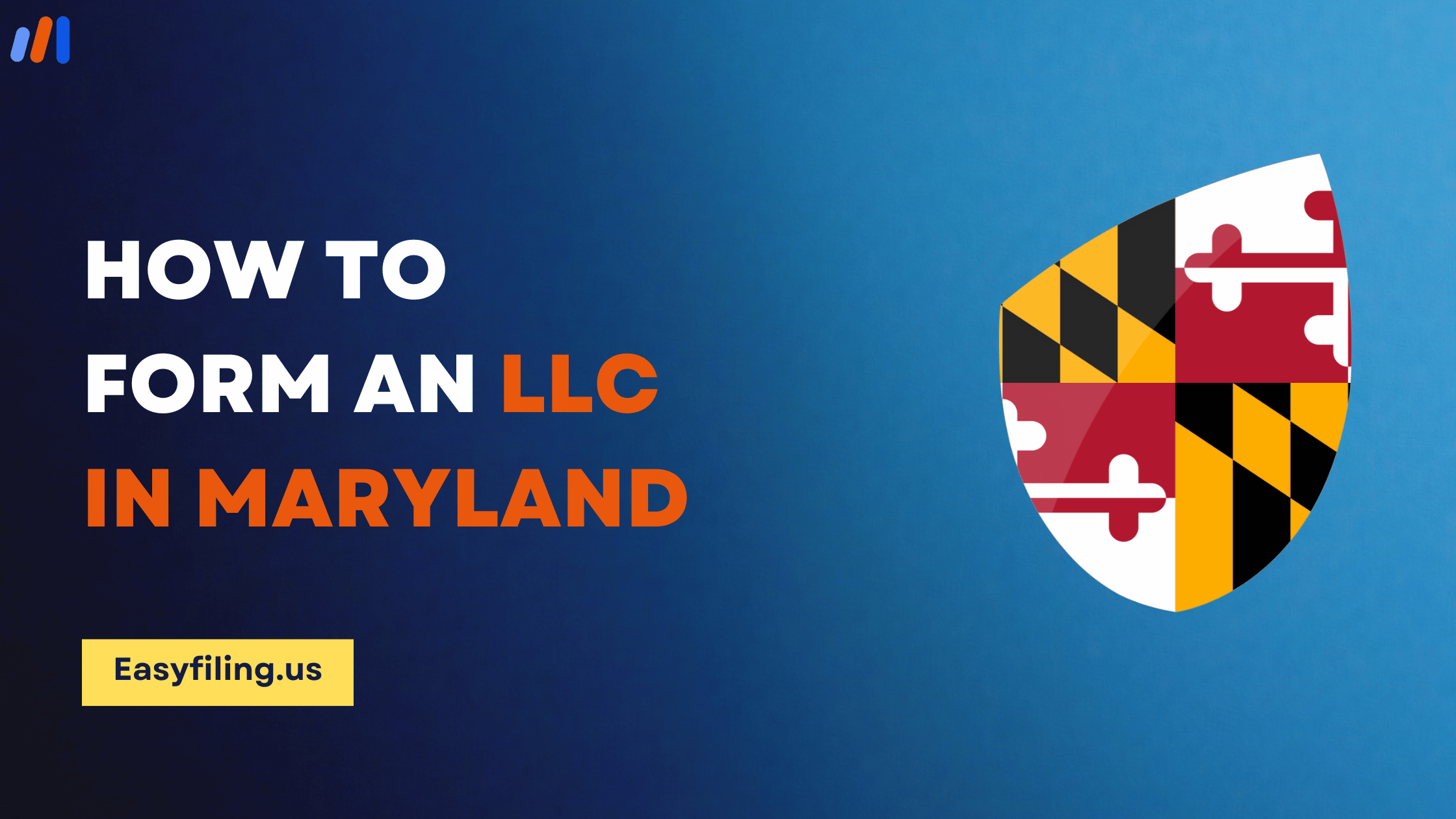Would you like to commence your entrepreneurial journey as an entrepreneur in the incredible state of Maryland? Leon is intelligent, and it is more advantageous to consider an LLC as a business structure for any business size and type.
An LLC can also be a sound asset protection strategy since personal assets will not be exposed to business risks, taxation will not be a problem since there will be pass-through taxation and the business structure does not require undue stress.
This guide provides an elaborate explanation of how to form an LLC in Maryland inside out. You will learn how to start and make sure the LLC is operational from making a creative business name, and doing the paperwork to the establishment of the business.
So, now we can see how implementing an LLC structure will help you in making all the business plans that you have for Maryland State come true.
Advantages of Forming an LLC in Maryland
Personal Asset Protection: The single most crucial benefit of an LLC that is worth noting is how it protects your assets. If you own an LLC, your assets such as your house, vehicle, or building, and even your bank accounts are usually safe from any business’s liabilities and lawsuits. This limitation of liability brings comfort to the person and also limits the risk of losing one’s assets.
Pass-Through Taxation: Most of the time, LLCs are treated as pass-through entities, meaning all the profits or losses generated by the business are included in the personal tax returns of the owners. This can be more beneficial as the advantages of being a corporation, which has to pay double taxes, corporation tax, and dividends tax, are not available.
Flexibility: LLCs are flexible when it comes to the ownership as well as the management of the entity. Your LLC can be registered as a one-man firm, two or more-person firm, or even more structured like a company. This flexibility enables you to change the way the ownership of your company is in-tuned.
Credibility: An LLC status makes your business look more professional. This shows the intention you have on the business which can enable you to win customers, suppliers, and others.
Attracting Investors: When it comes to external investment in the business, LLC is often the preferred business structure. This is because LLCs have advantages such as limited liability and pass-through taxation hence its investors prefer such a business structure.
Step 1: Chose a Unique Name For Your L.L.C
Name requirements: An LLC’s name needs to contain ‘Limited Liability Company’ or its abbreviations ‘LLC’ or ‘L.L.C. This is a necessary distinction to help the public and any stakeholders understand the nature of the business.
Name Availability: Before adopting a name for your business, you should always consult the Maryland Business Entity Search for availability checks so that you do not use a name that already belongs to an existing business. Taking this step is necessary to prevent language or market confusion as well as legal conflicts.
Reservation: If you do not wish to register the formation of the LLC straight away, you may reserve your name for 30 days through SDAT. This kind of reservation allows you to take time to assess your plans without running the risk of losing your favorite name.
Step 2: Number Of The Registered Agent
Who Can Be a Registered Agent?
The Open for business entity incorporation agent can be either an individual who resides in the state or a business incorporated in the jurisdiction. An agent must have a physical street address in Maryland; P.O. boxes are not acceptable.
Role: The registered agent is responsible for receiving services and processes for your LLC, which includes different notices such as notices of service of process, government correspondence, and documents that relate to compliance issues of the LLC.
Step 3: Submit Your Articles of Incorporation.
Form: Complete the Articles of Organization form available on the Maryland SDAT website. This document is intended for submission to the state to create your LLC.
Information Required:
- The title of your LLC
- Principal office address
- The agent’s name and address
- LLC member’s names (if necessary)
Filing Fee: Pay the filing fee which has currently been updated to be $100. This fee is important for the forming and official establishment of the LLC.
Submission: You can either complete the form online for faster processing or send the completed form through postal mail to SDAT if you do not use online facilities.
Step 4: Create an Operating Agreement
Purpose: Not obligatory in the state of Maryland, an Operating Agreement serves to define the ownership and management framework of your LLC. It can delineate the boundaries and expectations of each member and prevent conflicts from occurring.
Contents:
- The functions of the members
- Voting processes and power and structure of voting
- Methods of sharing and distributing profits
Step 5: Obtain an EIN
What is an EIN?
An employer identification number (EIN) is an identification number assigned to businesses by the Internal Revenue Service (IRS). Its function is comparable to that of a social security number to individuals about a business since it enables the opening of business bank accounts and filing taxes.
How to Apply: Seek an application for an EIN through the IRS portal. The whole procedure is very simple, cost-free, and takes little or no time before one receives the EIN.
Step 6: Maryland State Tax Registration
Sales tax Permit: About LLC selling goods without the Sales Tax Permit- Sales and use tax is crucial for any LLC the tax laws in Maryland require that the individual applies for the sales tax permit from the Maryland Comptroller’s Office. With this permit, your business can be able to collect sales tax from its customers and does not violate state tax laws.
Maryland Department of Labor: Due to the employment of employees, it is advisable to register the business with the Maryland Department of Labor to control state employment taxes. This step enables you to operate the business as required in the payment of wages.
Step 7: Licensing and Permits in Maryland
Business licenses: Local business components may require certain licenses and professional permits as per the activities of the LLC as the state or city requires. These may include a license to practice in that profession, health licenses, and at times zoning clearances.
Research Requirements: Call the local agencies that comprehend what your LLC is doing in their jurisdiction to find out what the local laws are. Learning the regulations is very important in avoiding penalties and functioning in compliance with due laws of operation of the business.
Step 8: Make sure you file annual reports
Filing Deadline: The Personal Property Return, which is an annual report known as the Personal Property Return is usually submitted on the 15th of April every year. Additionally, It is mandatory to file this report to keep the LLC in active standing.
Filing: You can file the report by submitting it online for ease or send it to the SDAT if you would rather file it on paper. The report contains information about the advantages and assets of your LLC and helps in making sure that the business remains up to standard with the law.
Conclusion
Maryland LLC formation is simple in that it engages choosing a distinguishable name, sitting as the registered agent, submitting a few forms, and adhering to the state bylaws.
I believe whenever these provisions are observed, considerable ground will have been gained towards registering any business.
Further assistance may be available if you seek the advice of a lawyer or business consultant about creating your LLC for success over the long term, and determine what other aids will help you in running your company efficiently.
Frequently Asked Questions (FAQs)
Can I convert my Maryland business to that of an LLC?
Yes, in Maryland existing businesses can be converted into LLCs by observing the state procedures for conversion and making the relevant applications to the state’s Department of Assessments and Taxation.
Is it possible for a non-resident of Maryland to register an LLC in that particular jurisdiction?
Non-residents may register an LLC in Maryland. However, they are required to meet the registered agent requirement in Maryland.
What tax classification applies to LLCs operating in Maryland?
Unless elected otherwise, an LLC in Maryland is deemed opted out of tax liability as a pass-through entity, i.e. the members are allocated profits and losses based on what members own, and such income and loss items are reported in the members’ tax returns. Alternatively, an LLC may choose to be taxed as a corporation.
File Your LLC Today
25$ off with a coupon
Lock in EasyFiling's transparent rates and get lifetime compliance support at no extra cost.
Get Started Now










